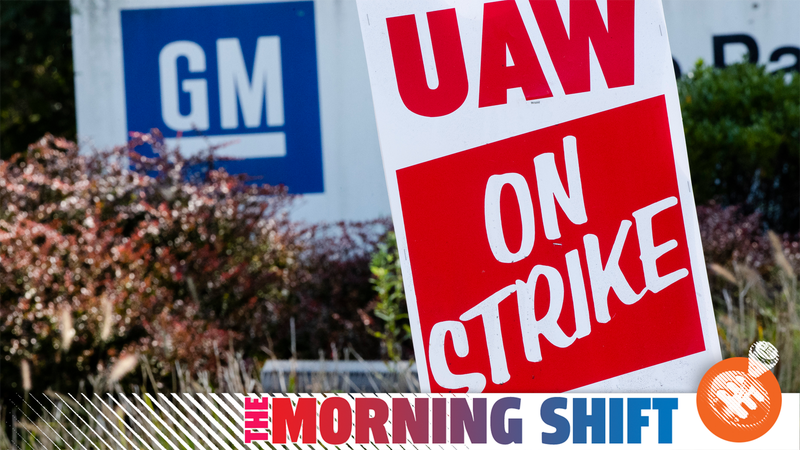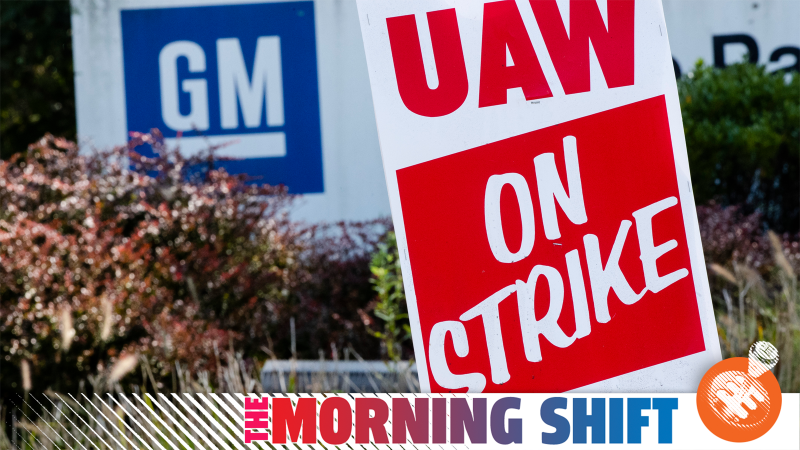
 The Morning ShiftAll your daily car news in one convenient place. Isn’t your time more important?
The Morning ShiftAll your daily car news in one convenient place. Isn’t your time more important? Union contract negotiations between the UAW and General Motors faces yet another setback, Nissan is eating itself alive with financial misconduct allegations, the trade war with China is hitting U.S. rail hard, and much more in The Morning Shift for Monday, October 7, 2019.
1st Gear: GM Doesn’t Budge Despite UAW Confidence
As General Motors’ union employees go into the fourth week of their strike as they negotiate a new contract with the automaker, things still aren’t looking poised for resolution anytime soon.
Advertisement
With GM rejecting the union’s proposal over the weekend, it looks like there’s still no end in sight, via Automotive News:
Terry Dittes, vice president of the UAW-GM department, said Sunday in a letter to members that GM this morning turned down an “extensive package” that addressed all of the union’s demands, ranging from wages to profit sharing. He said the company instead fell back on a previous offer the union already rejected.
[…]
The UAW’s Saturday offer addressed at least 35 hourly and three salaried proposals, Dittes wrote in a letter to Scott Sandefur, GM’s vice president of labor relations. Dittes said in the letter that GM did not explain why it rejected the UAW’s offer.
GM claims the UAW is pushing for too much, arguing that labor rates in Detroit are already the highest in the industry. The union wants guarantees that GM will keep future products in America to sustain jobs, but GM wants the ability to move some manufacturing elsewhere to cut down on costs.
All of this is a quick reversal from the confident tone of the UAW on Friday, which claimed good progress had been made. If there’s no quick resolution, GM may be facing shortages of truck inventories in as little as two weeks, AutoNews reports, which is a little awkward considering October is Truck Month for GM’s dealers.
Advertisement
Oh no, not our trucks!
Advertisement
2nd Gear: At Nissan, Maybe Everybody’s Doing Crimes
The drama at Nissan surrounding the ousting of former Chairman Carlos Ghosn over accusations of financial misconduct has become an orgy of distrust and finger-pointing. Now, an outside firm investigating the automaker’s executives claims one of the key whistleblowers that landed Ghosn in jail who still works at the company is also allegedly guilty of being improperly compensated, according to the New York Times:
Hari Nada, a powerful Nissan insider who was behind the ouster last year of Nissan’s chairman, Carlos Ghosn, over compensation issues, had been improperly overpaid himself, the firm found. A second insider involved in the corporate coup was responsible, the firm said, and had briefed Mr. Nada on what he had done.
[…]
Mr. Nada, the head of Nissan’s legal department and security office, had in 2017 received about $280,000 in “unjust enrichment,” the firm found.
The Nissan spokeswoman said that the more recent version of the law firm’s findings had included a different, lower amount for Mr. Nada’s overpayment. Nissan declined to release further details or to explain the discrepancy. “As the investigation progressed, updates were made,” it said.
Toshiaki Onuma, a senior Nissan administrator, changed the payout dates for stock-based compensation, the firm found, improperly increasing pay for Mr. Nada and others. The firm did not say why Mr. Onuma changed the dates.
Advertisement
Another big issue here is that Nada and Onuma are both expected to be key witnesses as supposed whistleblowers in the case against Carlos Ghosn, but if they’re also implicated in misconduct, it could severely damage their credibility as witnesses.
Advertisement
The law firm investigating the new allegations of misconduct also took issue with Nada’s lack of cooperation in their case:
The law firm said it was unable to verify what Mr. Onuma said because Mr. Nada refused to be interviewed.
Mr. Nada refused to talk to the law firm unless Mr. Nagai was present and given full authority over the interview, as well as its results. The law firm called Mr. Nada’s demands “unusual and inappropriate” and left the question of how to proceed with Mr. Nagai.
Advertisement
It’s a little complicated to try and summarize here, so you should check out the full details of the NYT report, but it’s safe to say the issues of misconduct within the ranks of Nissan seems to go much, much deeper than just the couple of top-level executives so far implicated.
The most alarming detail of it all, though, is that now the board at Nissan seems to be in total chaos amid mistrust and a lack of clarity on just what the hell is going on, again from the NYT:
The board’s meeting on Sept. 9 focused on Hiroto Saikawa, Mr. Ghosn’s successor as chief executive. The board unanimously asked for his resignation, and he resigned that day. He had admitted earlier that month that he received about $440,000 in improper share-based compensation. Mr. Saikawa said he had not realized that the overpayment was “against the rules” and vowed to return the money.
But some directors at the meeting demanded more information about the compensation of other executives and were growing frustrated with a lack of it, said people who were there. Days before, Bloomberg News reported that Mr. Nada had received overpayments, without specifying the amount or how. Jean-Dominique Senard, the chairman of Nissan’s French partner, Renault, and other board members asked why they were learning about top executives’ pay issues from media reports.
Advertisement
Definitely a sign that everything is under control, then?
3rd Gear: EVs Flop In India
As electric vehicles begin to take hold in major automotive markets like the U.S. and China, mostly thanks to increasingly strengthened government incentives, India seems to be completely rejecting the introduction of battery electric cars despite attempts by its government to motivate sales, according to Bloomberg:
In a nation of about 150 million drivers, only 130 [Hyundai] Kona SUVs were sold to dealers through August. That slow pace is emblematic of the difficulties carmakers face in establishing an electric foothold in the fourth-biggest auto market, even with committed government support.
Advertisement
This isn’t just a problem for Hyundai, and the lackluster demand for EVs isn’t new for India. There’s one really glaring problem, again from Bloomberg:
The Kona sells for about $35,000 while the average Indian earns about $2,000 a year — and the best-selling gas guzzler costs $4,000. Yet Kona’s sticker price only kicks off the conversation about why EVs aren’t gaining traction in India — there’s also a lack of charging infrastructure, a reluctance by banks to finance purchases and an unwillingness among government departments to use EVs as directed.
[…]
“The affordability of electric cars in India is just not there,” said R.C. Bhargava, chairman of Maruti Suzuki India Ltd., maker of the sales leader Alto. “I don’t think the government or the car companies expect that in the next two to three years there will be any real buying of electric vehicles.”
Advertisement
Here’s the real kicker; over the last six years, in a country with over 150 million drivers, only an estimated 8,000 electric vehicles have been sold. That’s including four years of the government attempting to push for vehicles with cleaner emissions.
It is definitely not good that one of the world’s biggest car markets, and one of the dirtiest regarding emissions, is still decades away from adopting cleaner EV infrastructure and sales. It really seems like, looking at reported annual average salaries of just $8,000 a year, there’s going to need to be a major structural shift for anything significant to change.
Advertisement
4th Gear: Trade War Pushes U.S. Rail Into Recession
Railroad shipments are lagging as industry grows more and more cautious of the ongoing trade war between the U.S. and China, according to Bloomberg, and the issue is being led by cars. From Bloomberg:
There’s no bottom in sight as the decline in carloads for large U.S. railroads widened to 5.5% in the third quarter, the biggest drop in three years, according to weekly reports from the Association of American Railroads. Shipments are down for autos, coal, grain, chemicals and consumer goods, with crude oil the only bright spot.
The rail downturn underscores the damage from the U.S.-China trade war, which is making shippers more cautious and crimping freight — validating earlier warnings from railroad executives. Companies that stocked up on inventory last year amid President Donald Trump’s tariff threats are now working it off. Adding to the cargo drop, a brief rise in coal exports has fizzled and bad weather has delayed crop harvests and dragged down grain carloads.
Advertisement
The issue stems from there simply being less cargo needed to be shipped by rail as less cargo from China hits U.S. ports due to changes in trade policy, an issue Canadian rail hasn’t had to deal with, as Bloomberg points out.
It doesn’t help that truck shipments are currently pushing cheaper rates, but the real cause for concern is that U.S. rail simply has no direction of growth to look forward to. The trade war has put them in a slump and the only hope is that it ends soon, and rail can hopefully see a return to the promising 3.6% rise in shipments back in 2018.
Advertisement
5th Gear: Volvo And Geely Spark A New Business
Volvo and its Chinese parent company Geely have decided to consolidate their combustion engine production into a new stand-alone operation, according to a Volvo press release:
For Geely, the planned new entity means technologically-advanced and efficient combustion engines and hybrid powertrains would be available to Geely Auto, Proton, Lotus, LEVC and LYNK & CO. The planned new stand-alone business can also supply third party manufacturers, providing possible growth opportunities.
The proposed new business is intended to be an attractive employer for approximately 3,000 employees from Volvo Cars and around 5,000 employees from Geely’s combustion engine operations including research and development, procurement, manufacturing, IT and finance functions. No reductions in the workforce are anticipated.
Advertisement
The consolidation of combustion and hybrid engine development and manufacturing leaves Volvo to pursue electric drivetrain development as it seeks to achieve a 50-50 split in fully electric and hybrid vehicle sales by 2025.
Reverse: Ford Gets Moving
Advertisement
Neutral: UAW Strike Impact On Sales
Will news of the ongoing struggle between the two dissuade people from going out to purchase a new car or truck, especially during Truck Month?
Advertisement
If you’re looking to buy a new car, do these headlines have an impact on your decisions?













